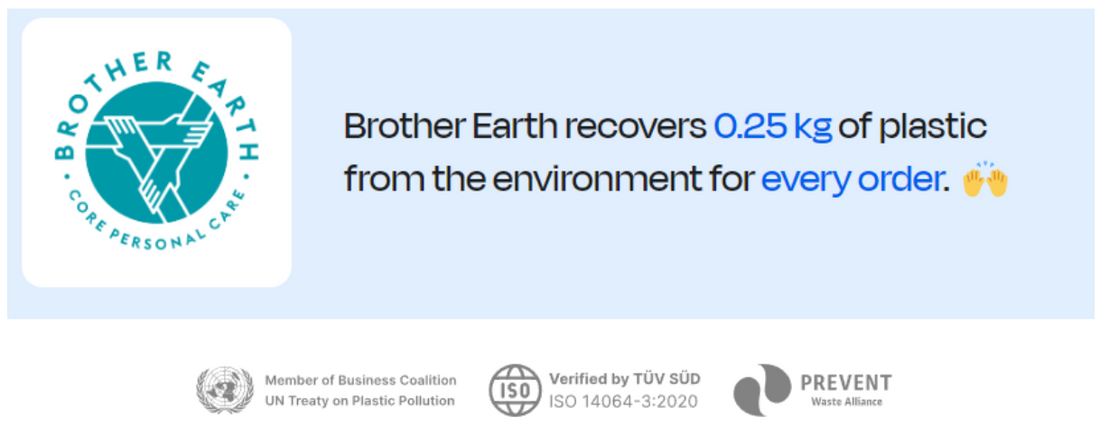The reduction of the use of plastic in our lives (starting with the bathroom) is key to our purpose at Brother Earth and to further our impact on the plastic problem we have also partnered with Clean Hub.
We have chosen to focus on just a few parts of the solution, but many approaches are needed to which we will explain below.
Before we start, it is important to note that plastic (used in the right way) is incredible. For example, it keeps us warm (or cool), and dry, and enables medicines like vaccines to be delivered safely at scale to billions of people.
The material itself isn’t the problem, it is how we use it. It is used too often and too widely, often seen as a single use item and is rarely recycled.
There isn’t one simple fix to the issue and a multifaceted approach is required that involves reducing plastic production, improving waste management, enhancing recycling, and developing sustainable alternatives.
1. Reduce Plastic Production and Use - The Brother Earth focus area
- Corporate Responsibility: Encourage companies to redesign products and packaging to minimise plastic use. Promote the use of biodegradable or compostable materials.
- Consumer Awareness and Behavior Change: Educate the public on the impact of plastic pollution and promote alternatives, such as reusable bags, bottles, and containers.
- Government Policies and Regulations: Implement bans or restrictions on single-use plastics, such as plastic bags, straws, and utensils. Introduce taxes or incentives to reduce plastic consumption.
2. Improve Waste Management Systems - The CleanHub focus area
- Enhanced Collection and Sorting: Improve waste collection infrastructure to ensure that plastic waste is properly sorted and recycled. Invest in technologies that automate and optimize the sorting process.
- Proper Disposal: Develop and enforce regulations for the proper disposal of plastic waste to prevent it from entering natural environments.
3. Increase Recycling Rates - recycle as best you can by using your local recycling scheme
- Technological Innovation: Invest in advanced recycling technologies, such as chemical recycling, which can break down plastics into their original monomers for reuse.
- Standardisation and Labelling: Standardise recycling labels to reduce confusion and contamination in recycling streams. Ensure that packaging is designed for recyclability.
- Extended Producer Responsibility (EPR): Implement EPR programs that require manufacturers to take responsibility for the end-of-life management of their plastic products.
4. Promote Sustainable Alternatives - As a consumer, choose brands that have improved their packaging
- Biodegradable and Compostable Plastics: Support research and development of plastics that break down more easily in the environment.
- Alternative Materials: Encourage the use of alternative materials, such as paper, glass, or metal, which have lower environmental impacts.
- Circular Economy Models: Promote circular economy practices, where products are designed to be reused, repaired, or remanufactured, thus reducing the need for new plastic production.
5. Addressing Microplastic Pollution - see our blog LINK
- Research and Monitoring: Increase research on the sources, distribution, and impacts of microplastics. Monitor and regulate industries that contribute to microplastic pollution, such as cosmetics and textiles.
- Clean Up: Upgrading wastewater treatment plants to capture microplastics before they are released into water bodies or systems to collect plastic that have entered the environment.
- Product Innovation: Stop the creation and release of microplastics, such as technologies to capture at the source (e.g. washing machine filters, none plastic textiles)
6. Community and Charities - You can contribute to a local initiative
- Local Clean-Up Efforts: Organise community clean-up events to remove plastic waste from beaches, rivers, and urban areas.
- Charities: Support groups working to combat plastic pollution and advocate for policy changes. Some organisations to check out include: Oceanic Society, Plastic Pollution Coalition, 5 Gyres, Algalita, Plastic Soup Foundation.
So who are CleanHub?CleanHub develop waste collection systems in coastal regions where they are needed most. The result will be 1000s of new waste management hubs globally which will directly prevent plastic waste reaching the ocean and provide dignified jobs for local communities. Everything they collect is processed in the most environmentally sustainable way available.
CleanHub is on a mission to prevent 50% of new ocean plastic by 2030.
Did you know that more than 2 billion people worldwide dispose of their trash in nature because there are no waste collection services.
Saying plastic will be collected is one thing, but actually doing it and tracking it is another. This is one of the reasons we chose CleanHub, as the entire process is tracked through their own Track & Trace technology, ensuring certified impact.
We have chosen to support one of their initiatives in North Sulawesi, Indonesia.



